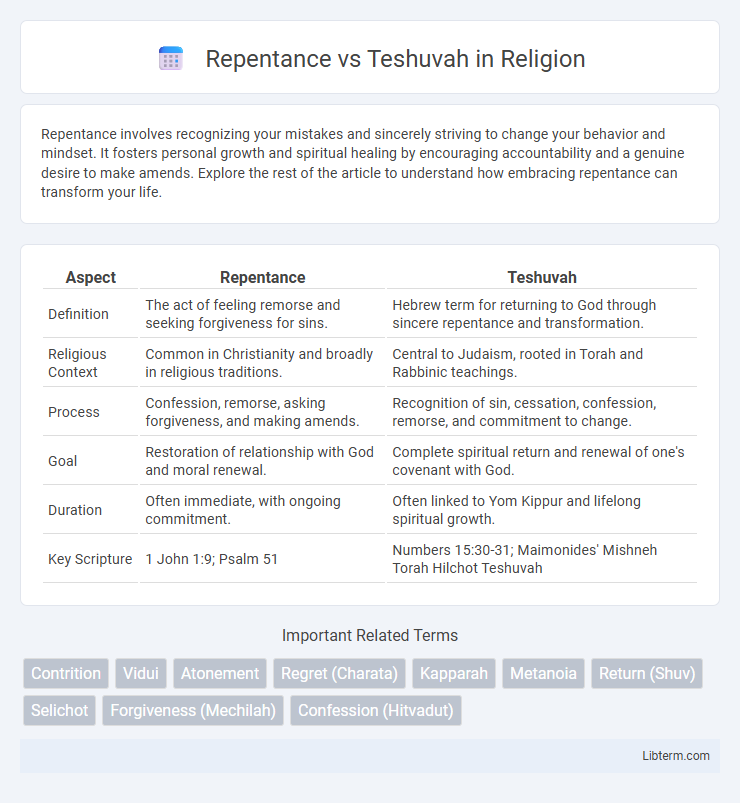Repentance involves recognizing your mistakes and sincerely striving to change your behavior and mindset. It fosters personal growth and spiritual healing by encouraging accountability and a genuine desire to make amends. Explore the rest of the article to understand how embracing repentance can transform your life.
Table of Comparison
| Aspect | Repentance | Teshuvah |
|---|---|---|
| Definition | The act of feeling remorse and seeking forgiveness for sins. | Hebrew term for returning to God through sincere repentance and transformation. |
| Religious Context | Common in Christianity and broadly in religious traditions. | Central to Judaism, rooted in Torah and Rabbinic teachings. |
| Process | Confession, remorse, asking forgiveness, and making amends. | Recognition of sin, cessation, confession, remorse, and commitment to change. |
| Goal | Restoration of relationship with God and moral renewal. | Complete spiritual return and renewal of one's covenant with God. |
| Duration | Often immediate, with ongoing commitment. | Often linked to Yom Kippur and lifelong spiritual growth. |
| Key Scripture | 1 John 1:9; Psalm 51 | Numbers 15:30-31; Maimonides' Mishneh Torah Hilchot Teshuvah |
Introduction to Repentance and Teshuvah
Repentance and Teshuvah both involve sincere remorse and a commitment to change past wrongs, rooted in personal accountability and spiritual renewal. Teshuvah, a Hebrew term meaning "return," emphasizes returning to one's true self and reconnecting with God, often within a Jewish ethical and religious framework. Repentance in a broader context highlights acknowledging mistakes, seeking forgiveness, and making amends to restore moral integrity and inner peace.
Defining Repentance in Western Thought
Repentance in Western thought primarily revolves around acknowledging wrongdoing, feeling genuine remorse, and seeking forgiveness as a moral and psychological process. Rooted in Judeo-Christian traditions, repentance emphasizes individual accountability and the intention to change future behavior. This concept often involves confession and penance, aiming to restore one's relationship with God and the community.
The Meaning of Teshuvah in Jewish Tradition
Teshuvah in Jewish tradition signifies a profound process of returning to God through sincere remorse, self-reflection, and commitment to change, distinct from the broader concept of repentance. Rooted in Torah teachings and highlighted during the High Holy Days, Teshuvah involves confession (viduy), acceptance of responsibility, and concrete steps toward ethical improvement. This spiritual practice emphasizes restoration of one's relationship with God and others, underscoring personal transformation beyond mere apology in Jewish law and ethics.
Linguistic Origins: Repentance vs Teshuvah
Repentance originates from the Latin word "paenitentia," meaning regret or remorse for past actions, emphasizing an internal emotional shift. Teshuvah derives from the Hebrew root "shuv," which means "to return," highlighting a return to one's true self and to God through corrective actions. Linguistically, repentance centers on feeling sorry, whereas teshuvah stresses transformation and restoration in behavior and relationship.
Spiritual Dimensions: Personal Transformation
Repentance involves acknowledging wrongdoing and seeking forgiveness, emphasizing moral responsibility and emotional contrition. Teshuvah, rooted in Jewish tradition, extends beyond mere apology to include deep self-reflection, sincere remorse, and a committed return to spiritual alignment with divine will. This process fosters profound personal transformation by realigning behaviors with ethical values and renewing one's spiritual identity.
Rituals and Practices Associated with Each
Repentance in many religious traditions often involves verbal confession, prayers, and acts of contrition, emphasizing personal acknowledgment of wrongdoing. Teshuvah in Judaism incorporates specific rituals such as fasting on Yom Kippur, giving charity (tzedakah), and seeking forgiveness from both God and individuals harmed, highlighting a comprehensive process of spiritual return and repair. Both practices emphasize sincere intention and transformational actions to restore moral and spiritual alignment.
Psychological Impact of Repentance and Teshuvah
Repentance and teshuvah both facilitate profound psychological healing by promoting self-reflection, accountability, and emotional release, yet teshuvah emphasizes a holistic transformation that reconnects individuals with their spiritual essence. Psychological studies highlight that teshuvah's structured process of regret, confession, resolution, and restitution contributes to reduced guilt, enhanced self-worth, and long-term behavioral change. Engaging in either practice can alleviate cognitive dissonance and foster mental well-being by restoring internal harmony and social relationships.
Community and Social Aspects
Repentance and teshuvah both emphasize repairing relationships within a community, highlighting accountability and reconciliation among individuals. Teshuvah involves a structured process of self-reflection, restitution, and commitment to change, fostering social harmony and trust. This communal dimension strengthens collective bonds and encourages mutual responsibility, promoting a supportive society.
Contemporary Relevance and Application
Repentance and Teshuvah both involve sincere remorse and a commitment to change, but Teshuvah, rooted in Jewish tradition, emphasizes a comprehensive return to ethical living through reflection, confession, and restitution. Contemporary relevance shines in how Teshuvah integrates personal transformation with community healing, making it a dynamic tool for modern self-improvement and social responsibility. In practical application, Teshuvah encourages ongoing self-assessment and active repair of relationships, fostering resilience and integrity in everyday life.
Conclusion: Integrating Both Paths
Repentance and Teshuvah converge as complementary paths that emphasize sincere self-reflection and transformative change. Embracing the emotional depth of repentance alongside the structured process of Teshuvah fosters profound spiritual growth and ethical realignment. Integrating both approaches enables a holistic journey toward forgiveness, accountability, and renewal in personal and religious contexts.
Repentance Infographic

 libterm.com
libterm.com